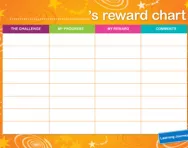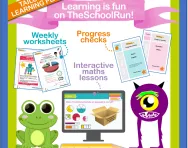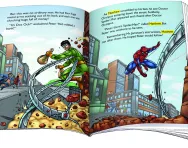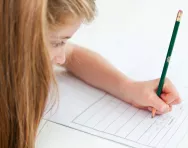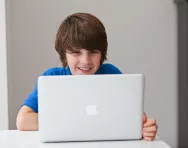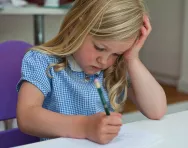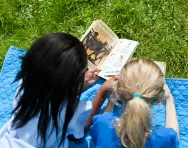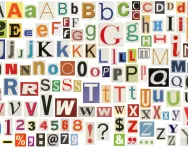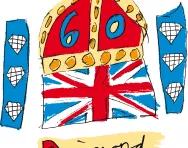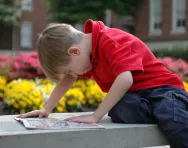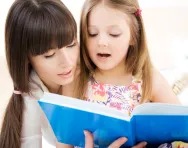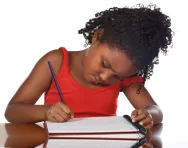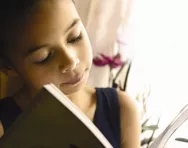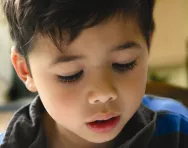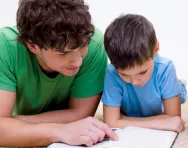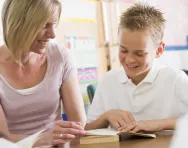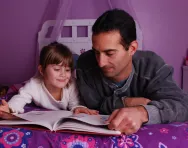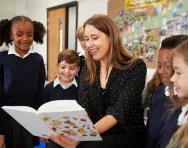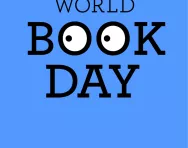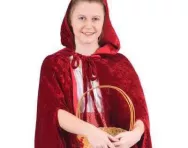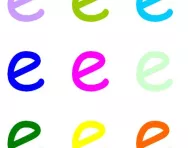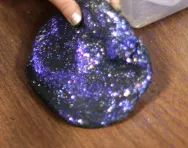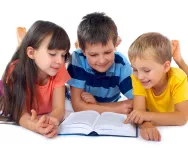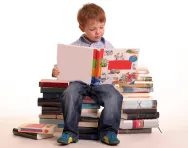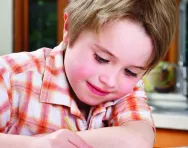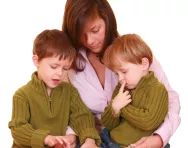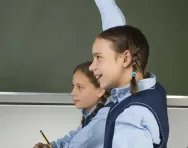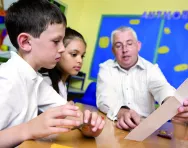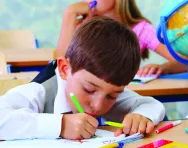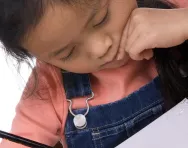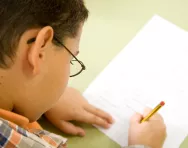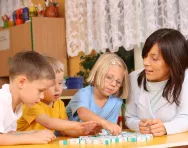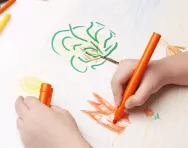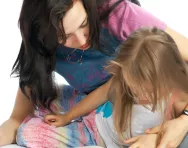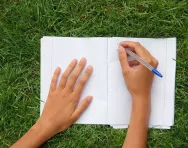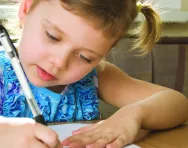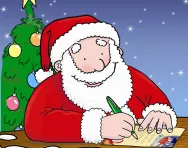The Learning Journey reward chart and certificates
Support your child's Learning Journey with these fantastic motivational resources – a colourful reward chart where you can set your own challenges and choose rewards together, and printable certificates to celebrate success.
How the Learning Journey works
Find out how our fantastic primary school learning programme – The Learning Journey – could benefit you and your child as well as full details of how to use the reward charts and certificates!
Best children’s books about Christmas
Get into the festive spirit with some Christmas-themed bedtime stories – perfect to snuggle up to in front of the tree, sipping mulled wine (you) and hot chocolate (them). From wintery classics to new favourites about Father Christmas and his life in the North Pole, this reading list is suitable for all ages.
Best personalised books for children
Give your child a really unique introduction to the world of fiction with a personalised book – after all, who wouldn’t want to be the hero or heroine of a fantastic adventure? Seeing their name – and face – in print, alongside favourite characters, will be a thrill whether they’re just starting to read for themselves or ready to embark on classic literature. We pick the best personalised books where your child has the starring role.
7 common dyslexia questions answered
If your child is dyslexic you'll want to help them get the support they need at school and at home. Dr John Rack, Head of Research, Development and Policy at Dyslexia Action, answers common questions about dyslexia identification, homework and tutoring and suggests sources of further information and advice to help you help your child.
Best interactive book websites
Stories are so much more than simple words on the printed page, as these websites demonstrate. Your child will be able to hear favourite authors talk about their work, enter the world of Harry Potter (what House will the Sorting Hat select for them?), play games based on classic books and find out more about some of their favourite characters. Log on to look around – then go back to the books and read more!
Handwriting practice: what all parents need to know
If you’re worried about your child’s handwriting and want to help them improve, you’re not alone – handwriting is an essential skill, but we all have to learn it, and it’s a very complex task. Legible, neat handwriting takes lots of practice – here are a few things to keep in mind when you’re working with your child at home.
7 of the best children’s reads for summer 2012
Mysteries, thrillers, supernatural tales and chick lit – we all want to pack a good book to read on holiday so make sure your child isn’t left out! From historical fiction to the new classic from Jacqueline Wilson, this super selection of books for KS2 readers means the whole family can have a fiction-packed break.
What is verbal reasoning?
Verbal reasoning tests are a key part of most secondary school selection and 11+ exams, as well as Year 7 CATs – but your child won’t necessarily be taught the skill at school. We explain just what verbal reasoning involves, and how you can help them prepare for their test.
Best royal reads for kids
Make sure the whole family feels part of royal festivities and include some celebratory reading in your schedule. We’ve picked some great options for you to read out loud and for independent readers. Time to hang the bunting and snuggle up with a book…
Using comics to improve your child’s literacy
Struggling to get your child to pick up a book? A comic might have more appeal – and some surprising literacy-boosting benefits, especially for boys. Lucy Dimbylow explains why you don’t need to be snobbish about your child’s choice of reading material.
10 ways to boost phonics confidence
How should you support your child’s learning and first reading at home to help them prepare for the Year 1 Phonics Screening Check? Teacher and Y1 parent Phoebe Doyle offers some practical tips and ideas.
Creative writing techniques for kids: a step-by-step guide to writing a story
Encouraging children to write a story of their very own can give them an enormous confidence boost, as well as help them consolidate their literacy learning by putting their phonics, grammar and reading skills into practice. Primary teacher Phoebe Doyle offers parents tips on how to get their children’s creative thoughts flowing.
How to improve your child’s reading skills in KS1
Parents naturally want their child to read to the best of their ability, but often aren’t sure how to help them build on the skills they learn in class. Primary teacher Phoebe Doyle offers some expert tips on what your child needs to know to move to the next reading level.
School reading schemes explained
Ask any parent of a Reception child about Biff, Chip and Kipper, and they'’ll know exactly who you'’re talking about. But just how do primary school reading schemes work, and how can you tell if your child is progressing at the right rate? Primary school reading schemes often use book bands to categorise reading materials. Book bands help determine the appropriate reading level for each child. Lucy Dimbylow puts these questions to the teachers who use reading schemes in the classroom.
Reading comprehension explained for parents
Once your child can read they’ll be working on understanding what they read and really engaging with words in their literacy lessons. Reading comprehension is also a big part of SATs. Teacher Alice Hart explains how you can help boost your child’s skills at home.
Teachers’ top 10 classroom discipline tricks
Does every homework session end in tears and tantrums? Or are you losing sleep over getting your child to learn their spellings? Lucy Dimbylow asked the people who manage 30 children at a time (gulp!) – teachers and teaching assistants – to share their tried and tested tricks.
Reading to learn: how to get the most from reading with your children
Reading with your children at home not only lets them practise new words and sounds, but it can also help to improve their reading comprehension skills. Education writer and primary teacher Phoebe Doyle gives her top tips on helping to enrich reading time to prepare them for KS1 English SATs.
Year 1 phonics screening word check
Our parents' guide to the Year 1 Phonics Screening Check explains what it is, how it is scored and how schools use the results. Find out what you need to know to support your child in our quick Q&A.
6 World Book Day activities for EYFS, KS1 & KS2
Celebrate World Book Day with these fun ideas for children of all ages – get a free book, join a reading group, raise money for charity and more!
No-sew costumes for World Book Day
As the children get excited over book week, it can leave us parents feeling more than a little stressed! Time-poor and not at all sewing-savvy Phoebe Doyle has some simple suggestions for effective World Book Day costumes that won’t break the bank.
What is ‘magic e’ or a split digraph?
The way children learn to spell using phonics and phonetic terminology can cause utter bewilderment to parents trying their best to help at home. Primary teacher Phoebe Doyle is on hand to explain the ‘magic e’, or split digraph.
4 ideas for homemade playdough
Help your child develop the motor skills needed for handwriting with these no-skills-needed ideas and recipes for playdough and similar slimy substances – ideal for sensory play and scientific investigations!
11 things parents need to know about the National Curriculum
It’s the basis for what your child learns every day, but what exactly is the National Curriculum and what does it teach? Education writer and primary teacher Phoebe Doyle offers some clarity.
Book-bored to bookworm: expert tips to get your child reading
Worried that your child always chooses screen time over books? Mum and teacher Phoebe Doyle asks the experts about turning your child into a busy bookworm.
Teachers’ tips to make tricky spellings easy
Does making your child prepare for the weekly spelling test make your heart sink? Forget mindless drilling – primary teacher and preparing-for-spelling-tests veteran Phoebe Doyle has found ways to take some of the stress out of learning tricky words.
How to create a reading-friendly home
Switch off the screens and help make reading a fun, relaxing and engaging pastime for your child by implementing these expert tips from primary school teacher and parent Phoebe Doyle.
What your child learns in Year 6 maths, English and science
Year 6 means the next round of SATs assessments! Start revising by knowing what the learning targets are for the new year, reviewing what was taught in Years 3, 4 and 5, and giving your child SATs practice papers and past assessments.
What your child learns in Year 5 maths, English and science
Understanding the new things your child will be learning in Year 5 can prepare both of you for the months ahead, and make homework sessions much easier. Read our quick guide to Year 5 maths, English and science to be ready for the new challenges.
What your child learns in Year 4 maths, English and science
Help your child prepare for the concepts and topics covered in Year 4 by knowing ahead of time what they’ll be learning in class.
What your child learns in Year 3 maths, English and science
Starting Year 3 also means entering a new Key Stage. Read on to find out what your child’s maths, English and science lessons will be like, and how they can keep up their studies outside of school with free Year 3 worksheets.
KS1 SATs writing assessment success
KS1 SATs are no longer compulsory, but may still be administered by some schools. If so, how will your child's writing be assessed at the end of KS1? We explain what teachers are looking for so you can help your child improve their work and boost their confidence.
What your child learns in Year 2 maths, English and science
Year 2 is when your child may take their Key Stage 1 assessments, but what does that mean? What will they learn? And how can you help? Find out in our parents’ guide.
What your child learns in Year 1 maths, English and science
Be prepared for what your child will learn in Year 1 with our quick reference guide to the key concepts and skills they’ll cover in class – find out how you can help them at home, too!
What your child learns in Reception
Understand what your child is learning in their first year of school, and find out how you can help them do their best.
10 ways to bring books to life for your child
Want to encourage your child to read more, but not sure where to start? We speak to education experts about how you can turn reading from a homework chore into a favourite activity.
8 great handwriting activities
Put the fun into handwriting practice! From everyday shopping lists to rainy day bookmaking, there’s something to inspire children of all ages and interests to pick up a pencil, says teacher and mum-of-two Phoebe Doyle.
Phonics and sounds explained
Wondering what those noises that your child has been chanting to you are? They're probably practising their phonics sounds – we explain what the sounds of phonics are, and how you can help your child learn them in Reception and beyond.
Handwriting dos and don’ts
Practising handwriting at home doesn’t have to be about copying out rows of letters and reaching writing targets. Make writing fun with these helpful tips from primary school teacher Phoebe Doyle.
Handwriting practice: writing to Santa
It’s the handwriting activity your child will be clamouring to start: writing to Father Christmas! Gather your child’s paper and pencils and settle down to compile the list, then organise a response from the big man himself, as well as a personalised Christmas message.
